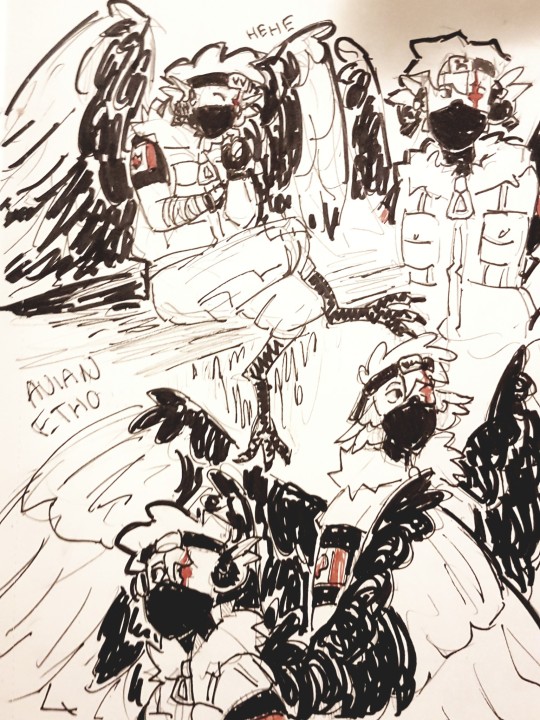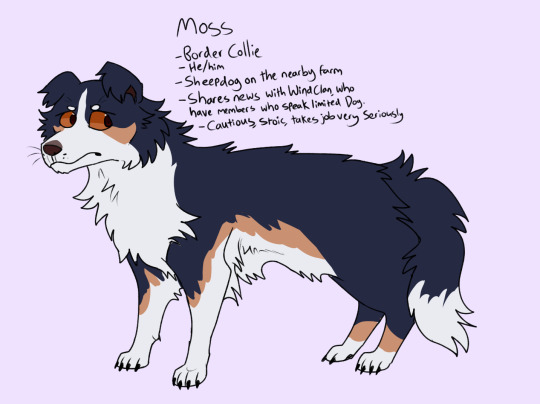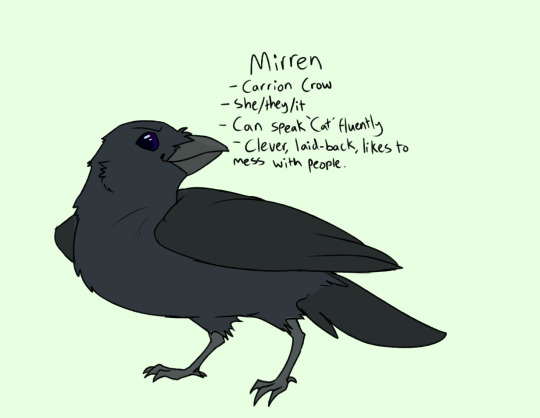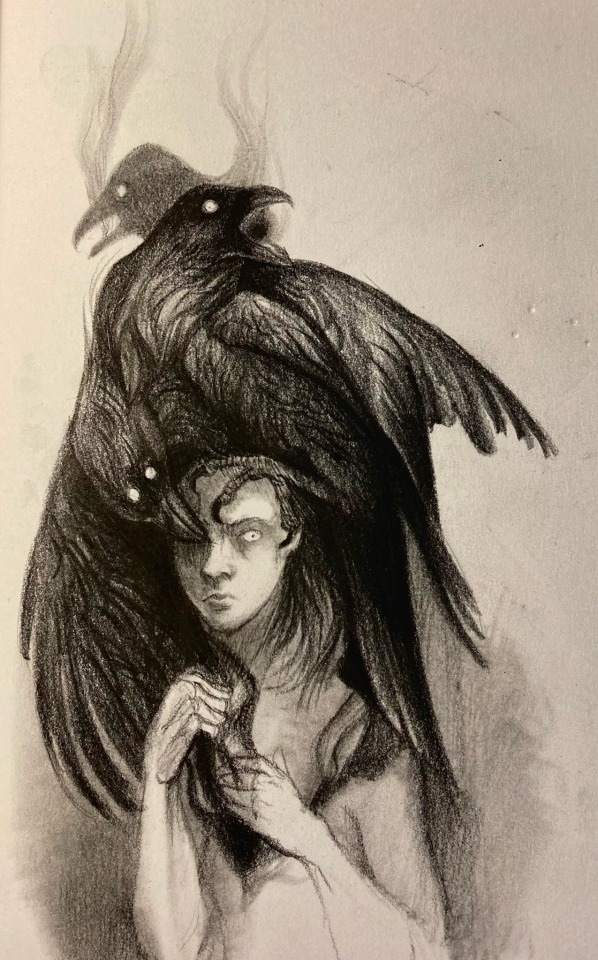#corvid thoughts
Text
Dedicating exercise to Lord Ares is so wonderful but my muscles are just aching. I’m excited to see results though. I hope to be getting some good muscle from working out like this
#hellenic polytheism#helpol#paganism#corvid thoughts#deity worship#hellenic worship#hellenic pagan#greek gods#ares deity#ares
183 notes
·
View notes
Text

just finished jaidens vod
#corvid creates#my first thought when i saw the same room#qsmp#mcyt#jaiden animations#qsmp jaiden#felps#qsmp felps
1K notes
·
View notes
Text
political opinion: fingers should have more joints
#not my only political opinion but. currently. my most FERVENT one#ok 2nd most fervent. actual most fervent is VOTE IN THE FUCKIN MIDTERMS U FUCKER MC FUCKENING FUCKERIST#anyway. ahem. fingers. more joints. self explanatory.#(also mostly unrelated but. when i was in. .. middle school maybe? there was a period of time where i fully believed 'Fervent' referred to#a species or genus or other grouping of mammal which included ferrets#like how Crows are a member of the Corvid family? yeah i thought Ferrets were a member of the Fervents#not my proudest moment yet i find myself oddly and ferociously proud#)#((no wait wait wait wait wait wait. FEREVENTLY proud))#(((also until relatively recently i thought it was spelled Fervant but we don't need to talk about that)))
5K notes
·
View notes
Text
Music and Intelligence
i made a followup / correction of this post
go read that instead, please I worked so fucking hard on it and people are STILL flocking to this version
I'm gonna preface this by saying I am by no means a professional biologist, I am just a biology student who nerds out about art and biology sharing an interesting thought I had this morning.
We don't know where music comes from. That is the very disappointing answer I got to a very interesting question I had this morning. The best answer science can come up with is ...eh, it's kind of just an evolutionary hiccup that developed out of nowhere.
I don't buy it.
Hypothesis: Music isn't an evolutionary hiccup but actually an integral aspect to developing sapience.
Think about this: One of the very first things we'll hear as human beings both now as we're born and in the ages past when we first evolved is birdsong. We associate birdsong with two very important things:
Winter has passed.
Dawn has broken.
Both of these give us a lot of valuable information like it is no longer dark, it is no longer cold, it is no longer dangerous, it is safe.
Early hominids with the ability to correctly identify birdsong and associate it with safety would thus be at great evolutionary advantage as they would be much more likely to survive the winter and the night, but that ability requires 3 major steps:
The ability to pick out distinct rhythms and melodies to correctly identify something as birdsong.
The ability to correlate said birdsong to the idea of the sun coming out.
The ability to make said connection through an abstract emotional response.
In other words, it requires pattern recognition, problem solving and complex emotion. Sapience. Music is not a coincidental fluke byproduct of sapience, it is the catalyst for developing sapience.
Granted this is largely speculation on my part; there's nothing I can do to prove that this is why our sapience evolved.
However.
We are not the only sapient life on earth, there are others, some debated, some not. Besides us there are dolphins, whales, corvids, parrots and elephants, and do you know what we all have in common? We deliberately communicate through melodic and rhythmic sounds, and we derive a particular pleasure from doing so. We all enjoy music.
If music was an evolutionary fluke in our development, how come it's a commonality among all sapient life? There are many animals that sing to mate and sing to intimidate and yet they lack any signs of sapience, but the ones that sing just because they can all happen to be the most intelligent creatures on earth.
Food for thought.
#biology#zoology#music#songs#philosophy#animals#anthropology#dolphin#whale#corvid#crow#raven#parrots#elephant#food for thought#shower thoughts
182 notes
·
View notes
Text
i don't feed the crows at work but i always say "hello, friend" when i see one of them. like, it's probably not unlucky to be rude to crows but i also think it isn't a bad idea to be polite, just in case.
today i had to pass one on the sidewalk, so i said "hello, friend, i have to pass behind you" and that god damn bird glanced at me and then STROLLED four steps forward so i could pass without getting into their space bubble. didn't even bother to hop, just went "oh that human" and moved aside.
#meg what is your problem#crows#corvids#i was surprised because i thought you had to actually feed them to get them to recognize you
157 notes
·
View notes
Note
avian etho maybe?

Okay so I mayyy have had quite a bit of fun with this
#my art#ask game#ethoslab#hermitcraft fanart#ethoslab fanart#mcyt#hermitcraft#anon#i might just adopt this as one of my designs honestly#if you notice that i draw his hair differently with every new design. yeah. im indecisive.#look i thought about corvids and their affinity for shiny things and ethos love of loot in stuff like do or vh and immediately decided#he needed to be one#and so now hes a magpie and im ignoring that their love of shiny things is actually a myth lmao#let me dream#also yeah this is really rough but tbh i just wanted to have fun and not bother with proper lines
85 notes
·
View notes
Text
what I am missing, I’ve realized, from most modern arthuriana stories, is the love
there is so much love between the knights of the round table. Not all of them - some of them do well and truly just despise each other - but so many of them love each other, and will be moved to exclaiming over it at any possible juncture. they love each other intensely. lancelot always being moved to tears over the thought of gawain’s death, and vice versa. galahaut giving up his crown for the bare possibility of winning Lancelot’s affections. percival’s bluff admiration of galahad.
the love doesn’t save them. it isn’t stronger than the bounds of revenge and family and duty and politics. lancelot kills gawain, and on it goes. everything falls apart. but the love was there, and that’s the draw and the tragedy of it are what keep me coming back to those stories. The knights of the round table unashamedly care deeply about each other.
arthurian adaptations that don’t carry over any of that love, that skip straight to the backbiting and squabbling without any of that devotion aren’t as interesting to me as stories where that devotion can exist and still things come to blood
(there’s a reason gawain forgives lancelot for his death after all)
#corvid rambles#arthuriana#arthurian lit#lancelot#Gawain#anyway I had a bunch of arthurian thoughts walking back from my partner’s place can you tell
588 notes
·
View notes
Text


warrior cats ocs who are NOT cats !!!
#theyre not SUPER involved w my oc stories but i thought they would be fun to draw :)#wc ocs#moss essentially has a peace treaty with windclan which has gone back a few generations of sheepdogs#mirren is just some gal with a social interest in the clans#logistically interspecies communication is a bit silly but who CARES it's wc and im here for fun#if millie can speak dog then my ocs can learn and pass down avian and canine languages#they mostly only speak to dogs and corvids though. some other birds. maybe a rough understanding of fox.#those guys are all about their kitty cat zooology
198 notes
·
View notes
Text

Had a bit of a “regression” this past week where I had stumbled upon and subsequently ripped open an old wound.
I’m always trying to shed my grudges, but their claws are sunk pretty deeply nonetheless. Between the gaslighting and the casual disregard, it’s hard to find any closure. I have to make my own.
I broke my carbon pencil 3 times, at which point I had to call it quits.
#personal art#vent art#grudge#self portrait#sketchbook#traditional media#carbon pencil#corvids for their memory of those who wronged them#it’s been 8 years and I still find myself furious#worst part is it’s a fellow artist I graduated with and whom everyone else likes#death by a thousand cuts#I want to heal but at this point I’m worried I never will#anyway don’t verbally or emotionally abuse people who thought you were their friend#I did absolutely nothing to deserve this treatment#when you’re the only one who knows someone is an asshole#and possibly a narcissist#this would be Hot Tea if I were in regular contact with a larger number of my fellow college graduates#not like it matters but this person is a better artist than I will ever be and that stings#even if I know art isn’t really my future anymore
167 notes
·
View notes
Text
Sylens is such an interesting character, because the narrative uses him to demonstrate that modern civilization doesn't inherently make people smarter.
Humanity can be creative, cunning, intelligent and wise (and sometimes the opposite), and it's not western civilization that makes us that way. Horizon manages to pull together the value that education is valuable and the loss of Apollo was a travesty, with the idea that people are not worth less because of it.
Sylens is an antagonist to Aloy in part because of the inherent worldview that he has, and that's going to be even more interesting if we see him continue to work together with Aloy in the next game.
You can't even blame Sylens for his perspective - he blames atrocities like the Sun Ring on superstition and the lack of education in the current world. But he discounts Aloy for the same reason, and she proves him wrong again and again. The narrative continues to use him to show that people are not worth less, are not less intelligent, if they don't have the same framework that he's working from.
#horizon zero dawn#horizon forbidden west#sylens#horizon meta#if you've seen this before it's because you're on the same discord server as I am#just me archiving my corvid thoughts
111 notes
·
View notes
Text
My car is finally fixed, thanks to Lord Hermes. Nothing was working to get it fixed this morning. I finally began go get to a breaking point, and sent up a desperate ask for help. A few minutes later, a very kind man comes up and offers to fix it for me. In thirty minutes, it’s running even better than before, and the man gave me his info and said to call on him should I need car help again.
Praise to the Gods, I don’t know what I’d do without Them.
#corvid thoughts#hellenic polytheism#helpol#paganism#deity worship#hellenic pagan#greek gods#hellenic worship#hermes deity#hermes
113 notes
·
View notes
Text

crow 927
624 notes
·
View notes
Text
Kim Kitsuragi - The bullet falls in the bag leaving a smattering of blood on the plastic. He raises the bag under his eyes and says:
Kim Kitsuragi - "Unknown calibre. Rifled. Some kind of brittle alloy, fractured on impact..."
You - "Can I have it?"
Kim Kitsuragi - "Of course. You've *earned* it." The lieutenant drops the bag in your bloody hand. It feels light.
Perception (Sight) - Your gardening glove is completely covered in the corpse's blood.
Inland Empire - Cold and absent of life.
Half Light - Lick your fingers.
Volition - What-
Electrochemistry - YES-
You - Um...?
Endurance - Uh, no. You barely got your shit together when approaching the hanging corpse. Your body will not be able to handle its dead blood inside it.
Electrochemistry - The dark liquid glistens on the yellow latex in the cold sunlight. Your fingers are *dripping* with it.
Authority - You outlived this sad, sad man. It's only right that you should feast upon his corpse.
Logic - No, you shouldn't. The corpse has been hanging outside - mouth open - for a week. In any case, it won't taste good.
Conceptualisation - That's because it's raw, unseasoned blood. This is just a little taste.
Perception (Smell) - You waft the odor towards your face. If you close your eyes, you can imagine it's a kebab.
Volition - We all know that the kebabs you ate were no better than a week-old corpse. Take the gloves off and clean them when you get back to your room.
Reaction Speed - You will never get this chance again, especially with how the lieutenant regarded you when you tried to remove the hanged man's boots.
You - Lick your fingers.
Perception (Taste) - You swipe the flat of your tongue along the back of your hand. Why did you do that? You could have just dabbed at it. It's disgustingly sour and tastes awful. You gag when your saliva washes the fluid down your throat.
Authority - You have bested this man. You have consumed him.
Electrochemistry - It's fucking vile. It's enlightening.
Logic - Great. Now that you've established that brain fluid and blood tastes bad, let's get back to the autopsy.
Kim Kitsuragi - He had turned to his notebook when you took the bagged bullet. He's still looking down at it.
Kim Kitsuragi - He was beginning to write the bullet wound's description. The pen has not touched the paper.
Composure - He *saw* you lick your bloody glove.
Empathy - It's not a surprise. He is still appalled.
Half Light - You conquered your prey. You are the predator.
Inland Empire - A four-legged beast with sharp claws and numerous teeth. Muscles powerful and flexing.
Shivers - In a grimy butcher shop in Faubourg, a rugged man pulls a thawed lamb down onto the somewhat clean counter. He grips the front legs and tendons crack. In the front of the shop, raw meats line the shelves. Red steaks with beautiful marbling, sausage casings stuffed full of spiced pork, pink breasts of chicken shining in the artificial light.
Electrochemistry - You recall the sweet ham of Gaston's sandwich.
Physical Instrument - Your muscles are also powerful and flex-worthy. Your meat would be highly coveted.
Volition - Right. Who would want to buy meat sourced from an addicted alcoholic? Take off the damn gloves.
You - "I wonder what I taste like."
Kim Kitsuragi - You pull him out of his silent stupor. After a second, he decides to ignore what you said. "We need to add an item to the injury list."
#EdC: He would be willing to help with that#this wasnt even for the last meme i just neeeeed cannibalism#new thought orb when harry walks past the kitchen and he has more cannibalism thoughts#yknow my friend said i was her SECOND favorite cannibal second to alastor#corvid creates#disco elysium#harry du bois#kim kitsuragi#disco elysium skills#celltw save me celltw#more often au
124 notes
·
View notes
Text
if i were to make razias shadows fan designs they would all be anthro birds. sorry
#hey guys are you hearing me. corvid adakias and pallis#i still havent degided what exact species.... ive been thinking hooded crow?#piebald pigeon anhura#with her dad being one of those fat rock pigeons#horned owl toba the tura#eyes obscured by shadow at all times. except when the songs climax hit. thats where they pierce you#POOTOO DOCTOR!!!!!!!!!#freaky bird for the freak#i just need visions for my imaginary music videos because none of my other stories fit#i thought to utilize toba the tura as the main song for an event in my keron worldbuilding but that event! is not set in stone yet...#razia's shadow
7 notes
·
View notes
Text
Re: Music and Intelligence
Before I start there's a couple things I need to get out of the way.
First off, this is a "follow up" of sorts to an old tumblr post of mine which you can find here. Feel free to read it if you're interested, just know that I wrote it on a whim without really doing any research.
Since writing the post I decided to write a paper on the subject for school, and I now know a lot more about the subject than I did back then.
I am also still by no means a professional biologist, nor an expert in any of the stuff I'll be talking about. I am a biology student, an artist, and an autist extraordinaire writing a post on tumblr. Take everything I say with a grain of salt if not two.
With that said,
I. What is Music?
That's a good fucking question, and if I'm going to be completely honest, we don't fucking know. It may seem obvious but the fact is whatever you think is the answer, someone else will disagree with you. What is and what isn't music is entirely subjective, and what you may think is music, someone else might just hear noise, and vice versa. But it's still a question we need to answer in order to continue, after all you cant find something when you don't know what you're looking for.
To spare you the boring part, for the purposes of this discussion music will be defined as an abstract form of verbal and / or instrumental communication based around the use of one or more "musical qualities" such as rhythm, melody, tone colour and pitch.
This definition is the result of a lot of discussions between me, my supervisors, my friends and my family, and is based in various scientific bases such as mathematics, history and neurology, as well as common consensus. But I won't bore you with the details.
II. How is Music?
Unless you are famed composer Ludwig van Beethoven, you might have noticed that when you listen to music, you tend to do so with your ears. Your ears are however not the part of you that process the music, the ears simply turn sound waves into electrical signals through a series of bones that groove it silly style to compress a liquid that tickles some incredibly sensitive hairs that send out electrical impulses in response. Got that? No? Doesn't matter.
What's important is the ear converts sound waves into electrical signals that the brain is capable of processing.
So how does the brain process music? Well for most sounds it's more or less fairly straight forwards; as the electrical impulses from the ear reach the brain, the temporal lobe (located just behind the temples) snatches up that signal and compares that signal with your memories in the hippocampus (the memory center, located inside the temporal lobe) in order to deduce what you heard, as well as comparing signals with the opposite temporal lobe to deduce where the sound came from. If the temporal lobe recognises a sound as being speech, that info is sent to the frontal lobe for processing and back again.
Music, however, is not so simple. While the first pass is similar to processing speech, by the time the signal has reached the frontal lobe the temporal lobe has begun sending out signals about the musical qualities to most other parts of the brain as well. Most notably the amygdala (responsible for emotion) and the parietal lobe (responsible for processing touch, spacial awareness and the somatosensory system) are sent into overdrive in order to process the emotional and rhythmic aspects of music and processing them as your own, hence why listening to music has such a strong emotional and sensory effect.
The brain is complex, and truthfully we don't know exactly how it works. After all, "If the human brain were so simple that we could understand it, we would be so simple that we couldn't."
But what we do know is that processing music is no simple task, in fact it is incredibly energy intensive, seemingly wasting resources in an already incredibly power hungry organ.
So of course that begs the question:
III-a. Why is Music?
This is where it gets a little more speculative. Truth is we don't know, and we likely never will. Unfortunately I can't give you a 100% true "this is how it happened" set in stone answer, but what I CAN give you is my best educated guess, and let you think about it in the mean time.
I've read dozens of papers on the origins of music and the origins of intelligence, but not a single one of them mention what, to me, seems like an obvious link between the two, aside from the occasional conclusion that music is an evolutionary hiccup and a side effect of intelligence. But I'd argue that not only is music not an evolutionary hiccup, but rather an integral part in the development of intelligence.
Music undeniably influences the brain in a massive way, but the exact amount is highly debated. Some are thoroughly convinced that music has the power to make people more intelligent, others believe music has no more influence over the brain than any other sound. There are plenty studies supporting both stances and an equal amount contradicting them. So where do I stand?
Intelligence is not one monolithic concept, but rather a series of cognitive skills that interact and interface with each other and the world around us. Problem solving, logic, emotional intelligence, spacial intelligence, linguistics, and creativity, to name a few, are all kinds of intelligence, all of which can be trained.
While music isn't some magical spell capable of just cranking up these cognitive skills, it does serve as an effective medium through which one can easily train several of these skills all at once, by virtue of engaging the entire brain, ESPECIALLY (but not exclusively) in the context of learning an instrument.
Learning an instrument is difficult and a large reason as to why is exactly because it engages so many aspects of the brain. Playing an instrument requires spacial awareness to know where to play, it requires problem solving to know how to play, it requires emotional intelligence to know what to play. It engages nearly every aspect of intelligence, and the ability to train all these facets simultaneously allows them to build off each other, paired with the fact that you're already training several skills in the same time as you would train one, comes together to form an intelligence greater than the sum of learning each skill individually.
III-b. Why Music?
The observant among you may have noticed that I've been talking a lot about "intelligence" in that last section, but I never bothered to define it, why is that? Simply put, I can't, I don't think it's possible. Intelligence is such a vast nebulous concept that no one definition of it would be just or even somewhat accurate, but going forwards I'll be talking about sapience specifically, often defined as the ability to feel and understand emotions as well as the ability to do complex problem solving. Good? Good.
Humans are the only sapient species on earth, that we know of for sure, at least. That isn't to say there aren't other potential candidates for sapience, because there absolutely are animals straddling the line of what we would consider sapient. So what animals are the most likely to be sapient? Well it's commonly agreed upon that us, chimps, elephants, cetaceans, corvids, parrots, and octopi make that list, but what you may notice is that besides our shared intelligence, we actually have very little in common otherwise: body shape, phyla, behavior, diets, environments, etc.
But the one thing that we all have in common besides our intelligence, also just happens to be a trait only observed in this seemingly random selection of animals: the ability to understand music. If music were an evolutionary hiccup, a mere coincidence in our development, surely it would not be a trait shared only by sapient animals, nearly all of which evolved their sapience separately.
So why do music and sapience seem to be mutually inclusive? Well, what is "intelligence" really if not the ability to take in and replicate knowledge? The more efficiently you are able to communicate a concept, and the more efficiently you're able to store and apply said concept, the more intelligent you are. It just happens that art is the most information dense form of communication, and music happens to be one that nearly everyone is capable of creating using no outside tools whatsoever.
Music is a universal language, one so deeply ingrained within us that it overpowers even the spoken language of modern day. Though it may have started as simple monotone calls to simply alert your next of kin of your presence, a la cicadas, the ability to parse that information efficiently would clear up more space to communicate more complex ideas, and over the span of hundreds of thousands of years, if not millions, those simple calls began communicating progressively more complex ideas, until eventually you would end up with what we now today know as full blown music.
Remember what I said earlier about music being an effective learning medium? Yeah, imagine that except over the span of eons.
That, I believe, is why music is.
#biology#art#zoology#taxonomy#animal behavior#music#songs#philosophy#anthropology#dolphin#whales#cetacean#crow#raven#corvid#corvids#parrots#birds#elephant#food for thought#evolution#evolutionary biology
6 notes
·
View notes
